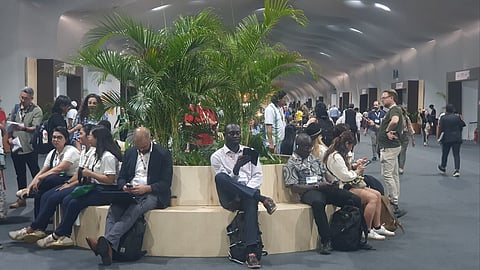

The 30th Conference of the Parties (COP30) to the United Nations Framework Convention on Climate Change (UNFCCC) in Belem, Brazil, began November 10, 2025. Here’s a look at what happened on the fourth day of COP30. Also read the diary for November 10, November 11, November 12, November 14, November 17, November 18, November 19, November 20, November 21.
Presidential Consultations on four issues, including Article 9.1 and unilateral trade measures, continued for the fourth day. Parties like the Like-Minded Developing Countries (LMDCs), the Arab Group, the African Group of Negotiators on Climate Change, stated that Article 9.1 (relates to the obligations of developed countries to provide finance to developing countries), is crucial for implementing the Paris Agreement. Many Parties also sought more clarity on the way forward. India, for LMDCs, reiterated its stand for a work program on Article 9.1. The European Union (EU) said a work program is not the best way forward and that this would amount to reframing solutions that were earlier not agreed upon. Parties were asked to submit written submissions by November 13.
The negotiations focused on the contentious issue of unilateral trade measures (UTM). Many developing countries led by Saudi Arabia on behalf of the LMDCs voiced that a unilateral measure such as the EU’s Carbon Border Adjustment Mechanism (CBAM) may well fund the transition from the pockets of the developing countries. The developed countries such as the EU and United Kingdom maintained that such policies are nationally determined and any discussion of them is outside the scope of UNFCCC. They also raised concerns about the framing of UTMs in paragraph 25 of the last negotiated draft text of the work programme which was at Bonn.
The countries negotiated on the most recent text that came out earlier on November 13. There were divergences on most aspects of the text that included the timeline of the UAE dialogue, the format in which it would be organised and whether there would need to be any reports and national communications of the countries. Lastly, there were also concerns raised around the nature of outputs from the dialogue that may or may not feed the second Global Stocktake. The developing countries warned against the dialogue itself becoming a stocktaking process.
Divergent views on substantive and procedural elements of the Sharm el-Sheikh Dialogue on Article 2.1(c) continued to dominate the two contact group discussions on this matter. The Arab Group, supported by others, pointed to the lack of safeguards in the co-chairs’ report on Article 2.1(c) and objected to drafting a new text without consensus. However, the subsequent informal consultation saw a significant shift as parties engaged constructively on the issue of safeguards. A broad consensus emerged that any work on aligning finance flows must be nationally determined, non-punitive, and firmly grounded in the principles of equity, Common but Differentiated Responsibilities and Respective Capabilities, sustainable development, and poverty eradication. Further, the Paris-alignment of finance flows must complement developed countries’ Article 9 obligations. This convergence on guardrails has allowed the co-chairs to proceed with drafting a decision text for further negotiation.
The COP30 Presidency launched the Belem Health Action Plan, to support the health sector’s adaptation to climate change, on November 13. This is the first international climate adaptation framework dedicated specifically to health. An investment of US$300 million was announced to support implementation of the plan, which outlines 60 action items across surveillance systems, evidence-based policies, and health innovation to address the health risks. The plan provides a roadmap for countries to confront the escalating climate-related health threats, from heatwaves and vector-borne diseases to the disruption of food and water systems. It is also a part of the COP30 Action Agenda, aligned with Objective 16, which promotes resilient health systems in the face of the climate crisis.
The United Nations Environment Programme launched the Global Cooling Watch 2025 report, which highlights that, without urgent action, the number of people at risk from extreme urban heat could increase sevenfold by 2050. Strategic investments in sustainable cooling—through climate-responsive architecture, expanded green infrastructure, and energy-efficient technologies—could reduce sectoral emissions by up to 64 per cent and generate trillions of dollars in energy savings, it said.